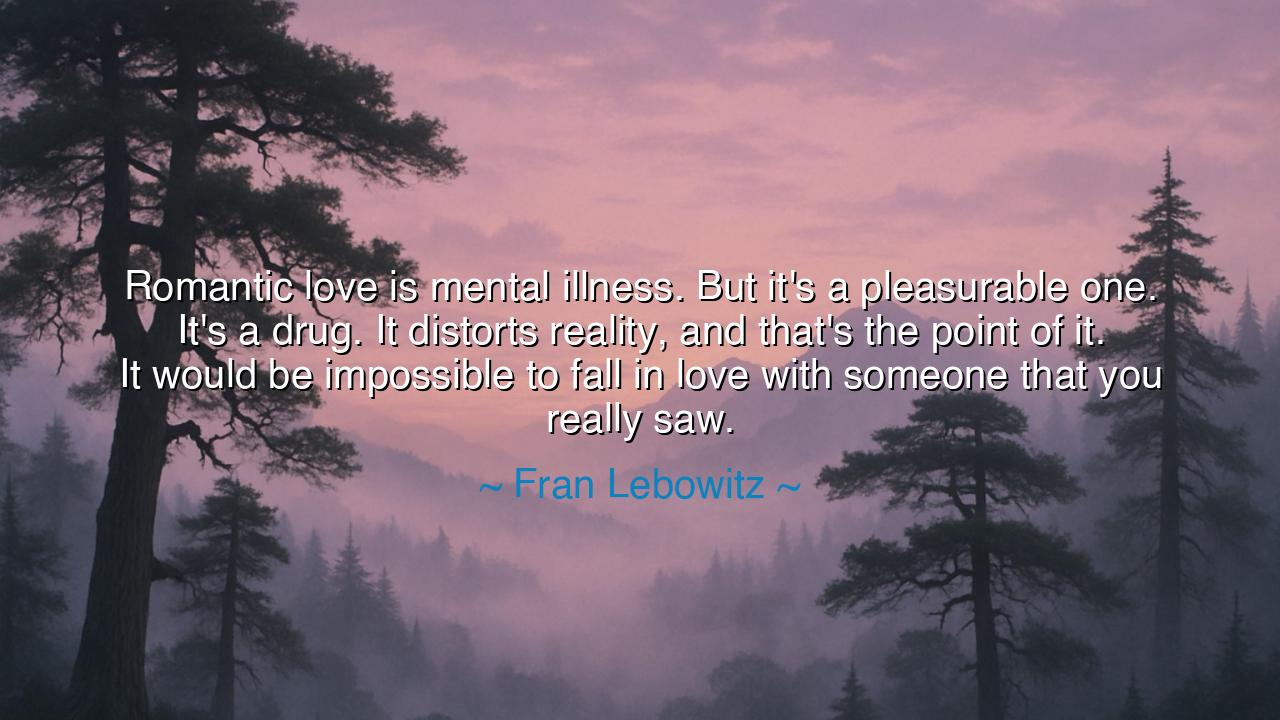
Romantic love is mental illness. But it's a pleasurable one. It's
Romantic love is mental illness. But it's a pleasurable one. It's a drug. It distorts reality, and that's the point of it. It would be impossible to fall in love with someone that you really saw.






The writer and social critic Fran Lebowitz once declared: “Romantic love is mental illness. But it’s a pleasurable one. It’s a drug. It distorts reality, and that’s the point of it. It would be impossible to fall in love with someone that you really saw.” In her sharp and ironic way, she reveals the intoxicating, irrational, and dangerous side of romantic love. Unlike the poets who exalt love as pure and divine, Lebowitz unmasks it as a fever of the mind—yet one which mankind willingly embraces. For though it clouds judgment, it also brings ecstasy, and humanity would rather be mad for love than sane without it.
When she calls it a mental illness, she speaks not in cruelty but in recognition of its symptoms: the sleepless nights, the obsessive thoughts, the blindness to flaws, the wild oscillation between bliss and despair. Love unsettles the order of reason; it bends perception until the beloved appears as flawless, almost divine. Yet this madness is pleasurable, for within it the world appears brighter, time seems fuller, and existence is charged with meaning. It is an illness that no one truly wishes to be cured of.
Lebowitz compares love to a drug, and history affirms her metaphor. The Greek philosopher Plato in his Symposium spoke of love as a form of divine madness, a frenzy sent by the gods. Modern science, too, has shown that being in love floods the brain with chemicals, altering perception much like a narcotic. Lovers see not with clear eyes but with hearts clouded by desire, inventing perfection where only humanity exists. Yet, as Lebowitz says, that is the point of it—love was never meant to be rational; its power lies in its ability to shatter the ordinary walls of reason and awaken the soul to new possibilities.
History offers endless tales of this distortion. Think of Antony and Cleopatra, whose passion for one another blinded them to politics, to reason, even to survival itself. Their love was not built on clarity, but on fire; it led them to ruin, yet also to immortality in story and song. The world still remembers them, not for measured wisdom, but for reckless devotion. Their story is proof of Lebowitz’s wisdom: love creates illusions, and those illusions, though costly, give life its grandeur.
The most striking claim is this: “It would be impossible to fall in love with someone that you really saw.” Here she exposes the raw paradox of romance. For love requires us to imagine, to idealize, to project qualities beyond what is merely visible. If we were to see a lover in perfect clarity—their flaws, their weaknesses, their ordinariness—our hearts would hesitate. But when we are under the spell, reality bends, and the beloved becomes radiant, heroic, divine. It is not truth that binds us at first, but vision. Only later, when passion fades, do we learn whether love can endure reality.
The lesson in this is not to despise love, but to understand it. We must recognize its madness, its distortions, and yet embrace them as part of the human story. Love may blind us, but in its blindness it carries us into experiences that reason alone would never allow. It teaches us courage, sacrifice, and the sweet pain of longing. The illusions may fall away, but the lessons remain.
Practically, this means we should cherish love for what it is: not a stable truth, but a fleeting ecstasy, a madness with purpose. Enter it with joy, but also with awareness. Let yourself be lifted by its fire, but when the illusions fade, learn to see the beloved as they truly are—and if love survives that, then it is no longer madness, but wisdom.
Thus, Fran Lebowitz, with her biting irony, gives us a paradoxical gift. Romantic love is madness, but it is sacred madness. It distorts, but in distorting, it reveals. It deceives, but in deceiving, it teaches. And in this illness we discover that perhaps the greatest cure for the human soul is not reason, but love’s beautiful and necessary delirium.






AAdministratorAdministrator
Welcome, honored guests. Please leave a comment, we will respond soon